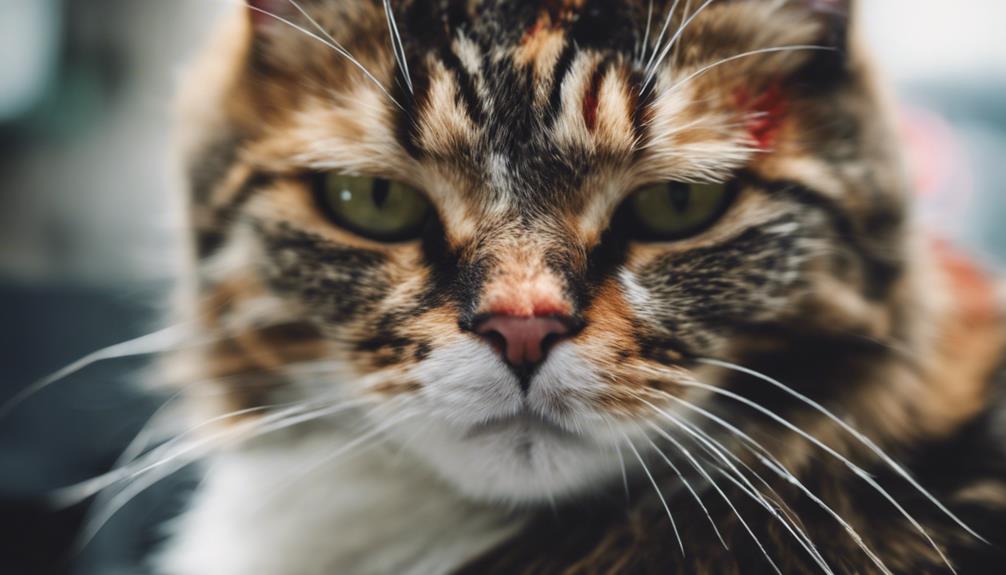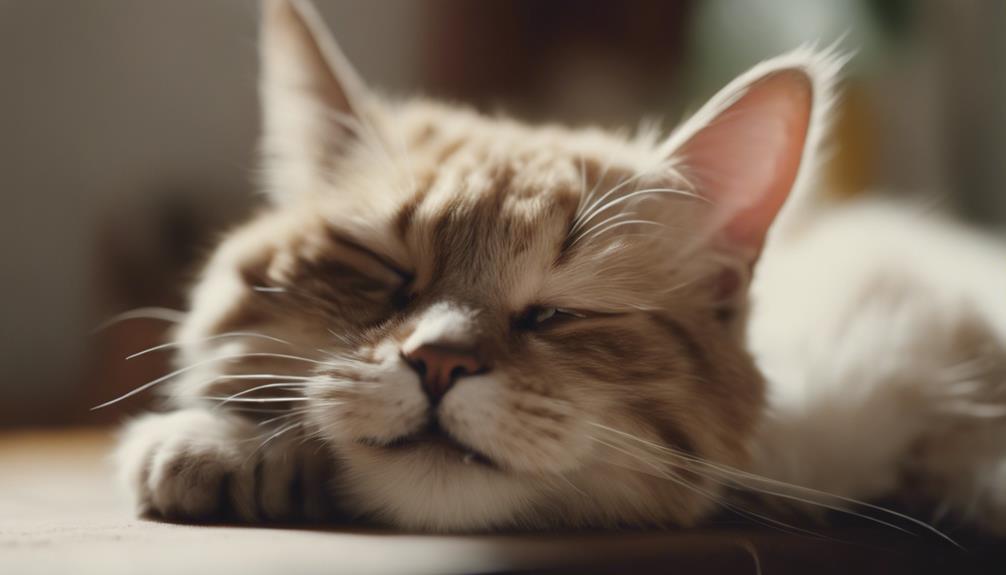The act of cats licking themselves is a behavior deeply ingrained in their nature, serving purposes that extend beyond mere cleanliness. While it is a common sight for cat owners, the reasons behind this self-grooming ritual are often more complex than meets the eye.
From maintaining body temperature to expressing emotional states, cats' licking habits offer a window into their well-being and state of mind. By unraveling the various motivations behind this behavior, a deeper understanding of feline psychology and health can be attained, prompting a closer look at how we care for and interact with our feline companions.
Key Takeaways
- Cats lick themselves for grooming, distributing oils, regulating temperature, and bonding.
- Abnormal licking signals can indicate health issues, pain, allergies, or behavioral problems.
- Over-grooming due to stress, anxiety, or hyperaesthesia requires proper diagnosis and treatment.
- Prevention, parasite control, addressing dermatitis, and enriching environments are essential for cat well-being.
Grooming Habits and Benefits
Cats' meticulous grooming routine, essential for their overall well-being, involves various benefits that go beyond mere cleanliness and aesthetic upkeep. Regular grooming helps distribute natural oils, keeping their fur healthy and shiny.
Additionally, grooming aids in regulating body temperature by spreading saliva across their coats. This self-care routine also prevents mats and tangles, reducing the need for human intervention or baths.
Furthermore, grooming is a social behavior that allows cats to bond with their owners and other feline companions. Observing a cat's grooming habits can provide insight into their well-being, as changes in grooming frequency or pattern may indicate underlying health issues or emotional distress.
Understanding the importance of grooming can help cat owners ensure their feline friends remain healthy and content.
Signs of Abnormal Licking Behavior
Understanding abnormal licking behavior in cats is crucial for identifying potential health issues or emotional distress that may require attention. Abnormal licking behavior can manifest in various ways, such as over-grooming, barbering, fur mowing, fur color changes, growling, or twitching followed by quick licking. Observing your cat's body language can also provide insights into abnormal grooming patterns. Addressing these signs promptly can help prevent underlying issues from escalating. Here is a table illustrating signs of abnormal licking behavior:
| Signs of Abnormal Licking Behavior | Examples |
|---|---|
| Over-grooming | Excessive licking leading to fur loss |
| Barbering | Chewing or pulling out fur of other cats |
| Fur color change | Discoloration due to excessive licking |
| Growling/twitching | Aggressive behavior followed by frantic grooming |
Health Issues and Over-Grooming

Excessive grooming in felines can often be attributed to underlying health issues that warrant careful observation and prompt intervention. Cats may groom excessively due to various health issues, indicating the need for further evaluation and treatment. Some common health issues that can lead to over-grooming include:
- Allergies to pollen, dust, food, and human dander
- Painful conditions like arthritis or wounds
- Parasitic infections from fleas, ticks, and mites
- Dermatitis, especially moist dermatitis in overweight cats
Addressing these underlying health issues is crucial to help cats overcome their excessive grooming habits and ensure their overall well-being. Regular veterinary check-ups and proper treatment can help manage and alleviate these health-related causes of over-grooming.
Behavioral Triggers for Excessive Licking
Behavioral triggers for excessive licking in felines can stem from various psychological and emotional factors. Cats may engage in over-grooming due to feline hyperaesthesia, causing them to react excessively to stimuli. Anxiety, stress, or lack of social interaction can also prompt cats to groom excessively.
Moreover, conditions like separation anxiety can contribute to cats licking themselves compulsively. Addressing these behavioral triggers is essential to prevent abnormal grooming habits. Providing environmental enrichment, interactive toys, and quality time can help reduce anxiety levels in cats, thereby decreasing the likelihood of excessive licking.
Understanding and addressing these emotional and psychological factors can play a crucial role in managing and preventing abnormal grooming behaviors in felines.
Importance of Prevention and Treatment

The prevention and treatment of grooming-related issues in cats are crucial aspects of their overall well-being and health maintenance. It is essential to address these issues promptly to ensure the cat's health and happiness.
To effectively prevent and treat grooming-related problems, consider the following:
- Regular grooming sessions and proper coat care routines are essential.
- Providing a balanced diet with necessary nutrients supports healthy skin and coat.
- Monitoring the cat's behavior for any signs of abnormal grooming habits.
- Seeking veterinary advice for underlying health issues or behavioral concerns.
Seeking Help From a Veterinarian
When addressing concerns related to your cat's grooming behavior and potential underlying health issues, seeking guidance from a qualified veterinarian is paramount for proper diagnosis and treatment. Veterinarians have the expertise to assess your cat's grooming habits, differentiate between normal and abnormal behavior, and identify any potential health issues that may be causing excessive licking.
Through a thorough physical examination, discussion of your cat's medical history, and possibly further diagnostic tests, a veterinarian can determine the root cause of the grooming issues. Whether it is a medical condition, behavioral problem, or a combination of factors, veterinarians can provide tailored treatment plans to address the specific needs of your feline companion and improve their overall well-being.
Conclusion
In conclusion, the intricate act of cats licking themselves serves various purposes, from grooming to potential health or emotional concerns.
As the saying goes, 'An ounce of prevention is worth a pound of cure.' Understanding the reasons behind feline self-grooming can help cat owners detect abnormal behaviors early on, leading to timely intervention and support.
By being attentive to their cats' grooming habits, owners can ensure their pets' well-being and happiness.




